Liberians are enamored of acronyms, it seems. Every sign, every store name, every window must be bedecked with an abbreviation, to give it—I can only surmise—a sense of import.
Some of these acronyms are eminently obvious: The International Church of Monrovia, for example, is always referred to by its assistant pastor as "The International Church of Monrovia, or ICM for short" (The fact that the offending appendage does nothing to shorten the sentence seems lost. But what do I know?)
Some, on the other hand, are perfectly superfluous. The John T. Fahme Provision Store has JTF, in parentheses, on its awning. Because, naturally, referring to "JTF" must obviously mean a reference for John T. Fahme. Lucky guy. Similarly, should you ever want to refer to God's Executive Praise, you are reminded that you may do so as GEP.
Some are more cumbersome than the names they abbreviate: Why you'd ever be tempted to refer to the War-Affected Women Employment and Empowerment Programme as WAWEEP is beyond me.
And then there are those the simply ironic. Does, for example, the Hope of Glory Conquerer's Chapel recognize the porcine nature of its acronym? Or is the Amputee Rescue Mission trying to be mean? (I think they might be).
Ah, but then there's my favorite. Because of the disturbing mental image it conjures: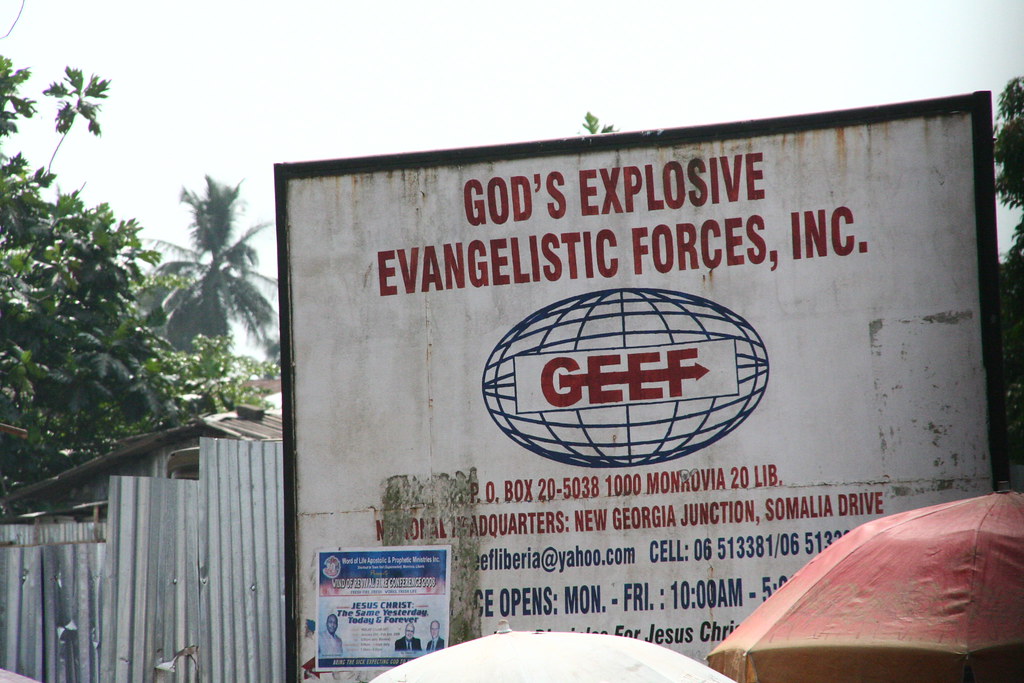
Consider yourself warned.
25 May 2008
God's explosion
Posted by
M
at
5/25/2008 08:23:00 AM
0
comments
![]()
The congregation of the sideshow
I have mentioned ward church in a few posts in the past, but I've never really written about it. After today, I must.
At half-past ten every Sunday morning, all the patients that want to and that aren't, for medical reasons, confined to their beds, are gathered on one of our wards for church. Now, for those of us who come from the west, this isn't church like we're used to. This isn't the sort of church you visit to hear convicting, intellectual, well-thought-out and well-referenced, culturally relevant sermons delivered by quite possibly one of the smartest men you've ever listened to (whom I still miss). This isn't the sort of church you go to for messages about always being happy, never giving up, pressing on, having only positive expectations, and claiming the pecuniary blessings of a divine being whose sole purpose in life is to make sure your SUV has enough gas. This isn't the sort of church you go to simply to have a thing to do on a Sunday morning, or to get your rock-music fix, or to pretend that a single hour covers a multitude.
Ward church is different. It's held in a hospital ward without any windows, and it spills out into hallways without any windows. It's filled with a congregation of the transient—a group of short-term volunteers from thirty-five nations, and short-term patients from the surrounding four or five.
And today, they were dancing (what am I saying? Every day, they're dancing). It struck me, from my comfortable perch in the back of the room: the guy on congas? He was a man who, just two months ago, had a massive, fungating, smelly squamous cell carcinoma growing off his left shoulder. The guy next to him? He almost died in February from a dental infection that had spread to his chest. (The two of them have become fast friends; they come every week, despite no longer being patients). And the men and the women dancing, spurring us occidental types on to louder singing? Their faces were fantastically deformed by Brobdingnagian tumors, scarred expressionless by burns, and bandaged beyond recognition. They jumped, shuffled, and shook, with their trachs, their crutches, their legs casted into immobility. They danced, amputated. They sang, voiceless. They smiled, scarred.
In the middle of all of us westerners who sheepishly ringed the edges, this was the church of the outcast, the shunned, the spurned, the grotesque. This was the congregation of the sideshow.
And it was beautiful.
Posted by
M
at
5/25/2008 07:27:00 AM
0
comments
![]()
Labels: Liberia, Patient stories
18 May 2008
The etiquette of calendars

I had no plans of visiting Guinea. The trip to Robertsport was enough off-road adventure for one outreach. I thought.
But, the ship maintains a departures and arrivals list, available publicly (to the crew, at least). I was perusing the this list one day, bemoaning the constant exodus of outright amazing people, when I ran across my name. Evidently, I was leaving the ship on May 6.
I had no idea.
Turns out, it had been decided that I was joining a group of four others and heading up-country—and out of country—to Guinea, in search of more patients. See, despite a wildly successful screening day in February, the entire surgical schedule wasn't filled (this, likely, is due to the fact that the ship has been in Liberia a few times before—it's actually made a dent in the need here). So, every few weeks, teams have been sent out to other parts of Liberia, further afield from Monrovia, looking for patients who might have been missed. We're flinging out a broader net.
The net, on May 6, was to extend to the eastern portion of Guinea, to the section of the country, just across the Liberian border, called Guinée Forrestière. Of the four topographic sections of Guinea—from west to east, they are Basse-Côte, a thin band of coastal land encompassing Conakry, The Fouta Djalon plateau, Haute Guinée, and finally Guinée Forrestière—the latter is the furthest away from the capital, which is where the Africa Mercy will dock the next time it visits the country. As a result, Guinée Forrestière is better served from Liberia than from its own port, 24 hours away.
It was, therefore, to the virgin African rainforests of Guinea that we set out, across roads that started out pretty well (and ended up making us thankful for four-wheel-drive control), toward N'Zérékoré, an NGO hub, and the biggest city in the region. Just outside of N'Zérékoré is a small village called N'Zao, and a mission hospital at which we were based.
Let me tell you: land borders are the same, the world over. And they are infinitely more fun than any airport immigration, because, for the most part, they are shacks, staffed by bored men and their muscid companions, and adorned with tattered calendars of yesteryear. The land border between Liberia and Guinea is no different. Except that the calendar of yesteryear was juxtaposed with a ghastly photodocumentary of Saddam Hussein's execution.
The land border is to your left as you drive, just before the leper colony (no, I'm not making that up). There are five checkpoints, each a little more thinly-veiled attempt at extracting your money than the other. There is only one such checkpoint on the Liberian side; the rest are across the bridge. That's right: four checkpoints before Guinea lets you into its embrace. It's a long, protracted no-man's land, filled with plenty of men. And women. And children. And livestock.
Which, incidentally, you don't notice are missing from Liberia until you leave the country. Guinea has livestock everywhere. You wonder where Liberia's all went; unfortuantely, the gruesome truth is that they were all eaten during the war. But not so in Guinea. The road is littered with fowl (guinea- and otherwise), pigs, goats, sheep, dogs, and cats.
Once you enter no-man's land, the demigod that sits enthroned in each checkpoint expects a little gift from you. On our way into Guinea, we were guided by a man who's lived there for nearly two decades and were therefore shielded from these dealings. On our way back, we weren't. And, I didn't realize that this was the culture until I walked out of our first checkpoint with all five passports, having thanked the guard, shaken his hand, and sprinkled blessings on his family. As I was leaving, he called to me, "Et quoi? Tu n'as rien pour moi?"
Thankfully, our hosts in Guinea had anticipated this turn of events. They had given us enough calendars (yes; calendars) for each checkpoint. This small offering seemed to appease the little demigod, and we were let through. It worked on all the others, too. Who would have thought? I may try the calendar gambit on my way into Canada.
I'm just starting to get comfortable with this African way of dealing with things. Case in point: on our second day in Guinea, we were taken up the Nimba mountain range. It forms part of the border and is eminently climbable from the Liberian side; it's a common trip for crew from the ship. The Guinean side, though, has been taken over by a mining company and is closed to foreigners. Except that one of our hosts knew someone in the local government, who knew someone else, who took the day off to show us around. And to show off his political muscles at the mining company's gate.
Because of this man's clout (I never got his name. He was simply known as The General), we were welcomed at the mine by its director. Whose smirking first words to us, followed closely by a conspiratorial guffaw from his underlings, were, "I'm glad your primary concern is healthcare and not the environment." We were shown around the compound, given lunch, and sent away on a tour of the region.

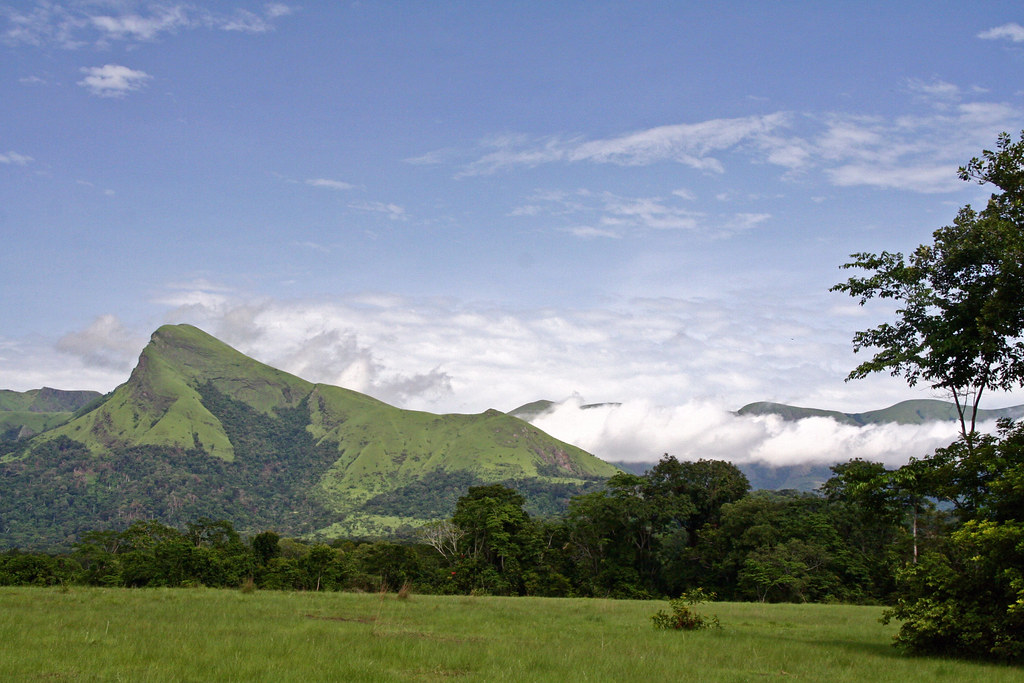

When all was over, The General also graciously took us to his home, to meet the mayor, and to dine (again) on rice, well water, and boiled kidney and liver. I'm not making that up, either.
The screening was a success, by the way. Twenty-two patients will come down to the ship in the next few months for their operations. One of these has already done so. 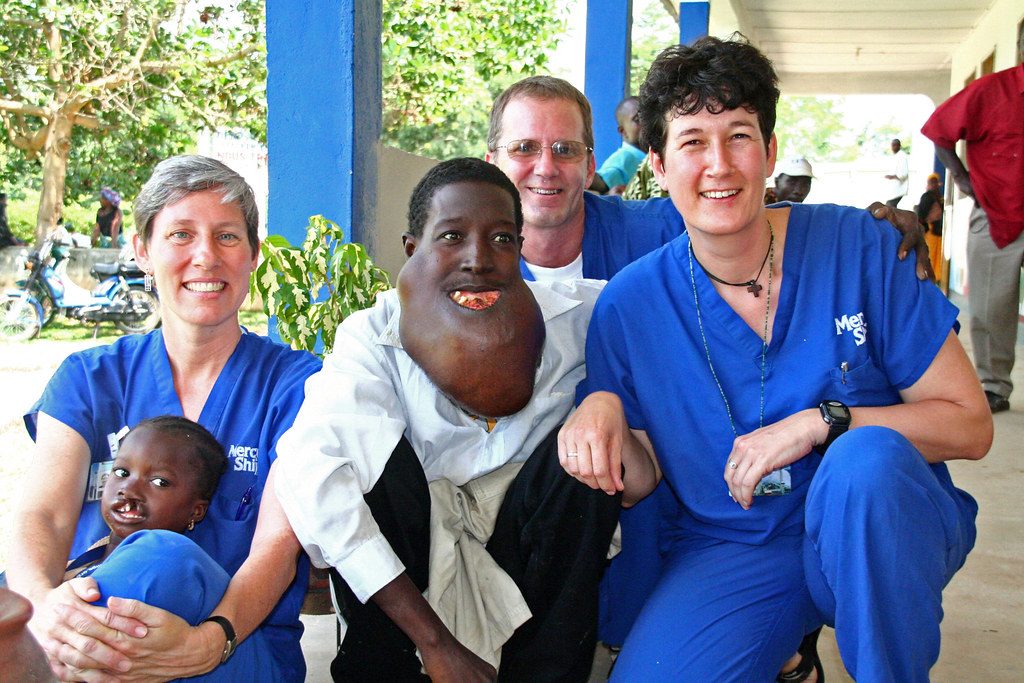
For this man, a twenty-two-year-old economics student, the boiled kidney was worth it. Despite a six-and-a-half-pound tumor growing on his face, he was one of the kindest men I've met. For a third of his life, he'd had this tumor on his jaw, subjecting him, likely, to insane amounts of ridicule. But when the cameras came out, he dove into each one's field. His smile was infectious. His attempts at befriending a child with a cleft lip and palate were heartfelt (if immediately rebuffed; she's in the picture too). And as I write, he's asleep on the wards. Six and a half pounds lighter.
Posted by
M
at
5/18/2008 07:47:00 AM
3
comments
![]()
14 May 2008
Pita for 450
What does it take to cook for 450 people?
I knew it was massive. We get fed three meals a day here. Each one of the four 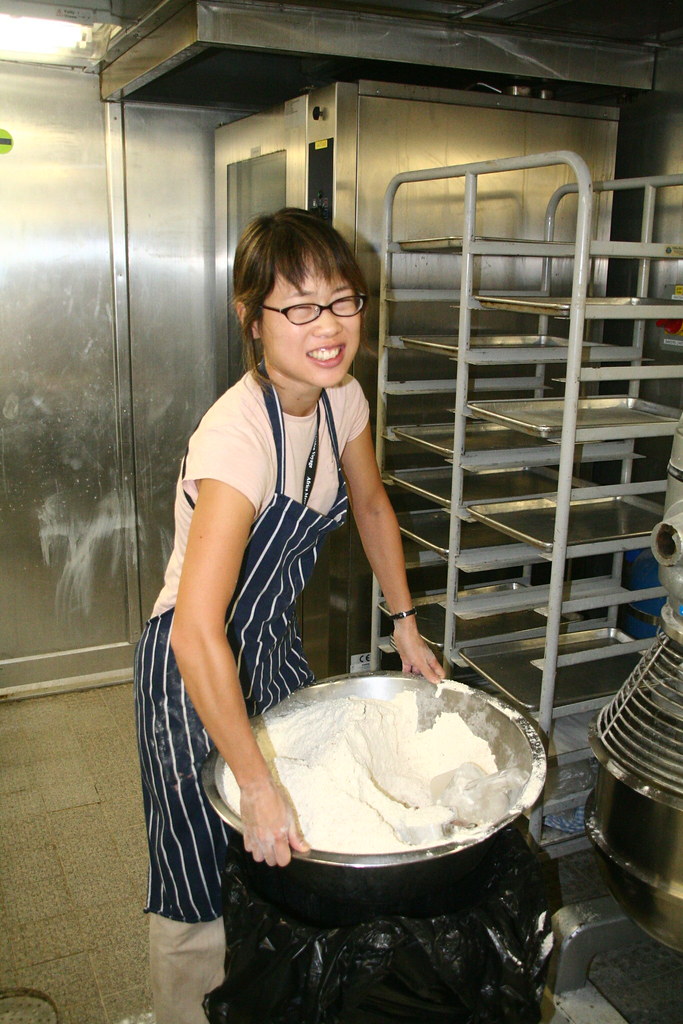 hundred fifty of us get more food than we could want, three times a day, seven days a week. Just what does it take to provide that for us?
hundred fifty of us get more food than we could want, three times a day, seven days a week. Just what does it take to provide that for us?
Well, let me tell you. For one meal, it takes:
90 cups of flour
210 grams of yeast
6 gallons of water
1 gallon of olive oil
72 liters of yoghurt
100 onions
40 legs of lamb
20 heads of garlic
1 can of dried mint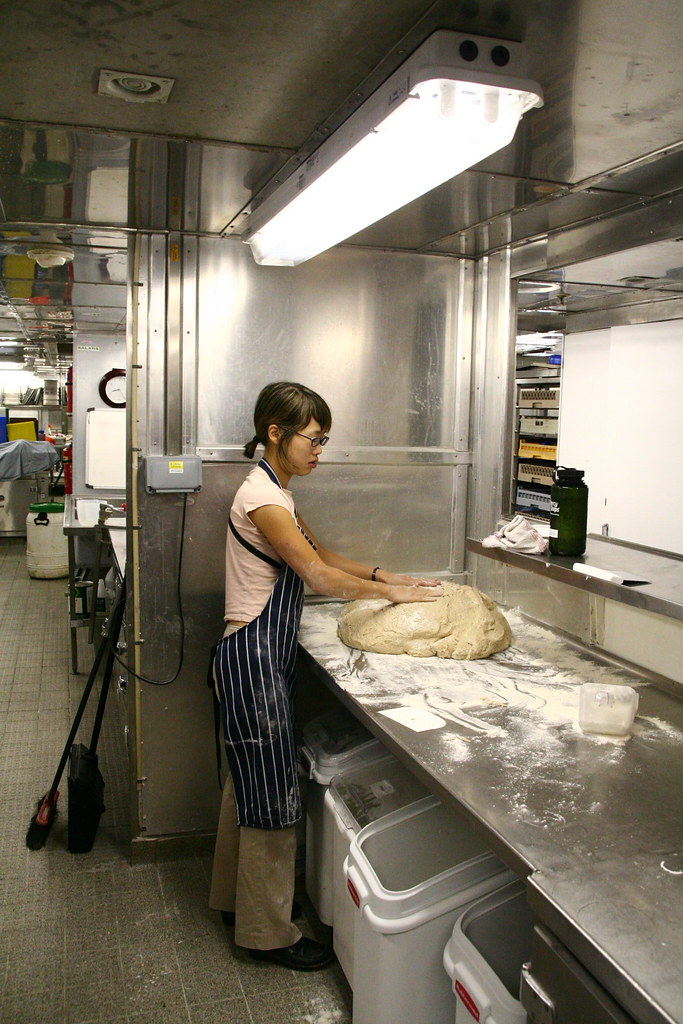
4 gallons of rice
1 pound of butter
1 gallon of pasta
750 ml of salt
2 liters of lemon juice
10 gallons of garbanzo beans
2 cups of paprika
12 hours of work
5 other galley staff
and two very dedicated friends.

It was a glimpse into a part of the ship that we don't see often—a part of the ship that works hard, no doubt, and that does so with parsimonious amounts of positive feedback. So, here it is, publicly: Thank you, Peter, Tyrone, Ernest, Patrick, and Michal. Thank you, and Nigel and Margarita, for helping with the meal, and thank you (and Tim and Vandi and Eddie and Freddie and Carlos on Saturdays) for the food. Daily.
Oh, and by the way. In a totally unrelated attempt at shameless reciprocal plugging, we've just been included in a compendium of the 100 best travel blogs. We're about midway down, in the road-less-travelled section. Some of the blogs we read regularly are there too. Check them out, if you've got a lazy, rainy weekend.
Posted by
M
at
5/14/2008 04:21:00 PM
1 comments
![]()
Will the real Mamie Kankor please stand up?
Yesterday morning we were expecting a 34 year old woman named Mamie Kankor to arrive for surgery. Mamie had extensive burns to both her legs, the scar wrapping all the way around her thighs and impairing her ability to walk. She had been seen at our screening early on in Febuary and later by Dr. Tertius, our South African plastic surgeon, who agreed that she would need skin grafts to her burns so that she could move about freely again. So when we called out her name and she came in, we went through the usual procedure of getting her demographic information, checking her blood pressure, heart rate, temperature, and weight, and of course explaining to her the planned surgical procedure and getting her consent for them. She readily agreed and signed all the neccesary paperwork. After being processed by the admissions nurses she moved to my desk so that I could do a history and physical and deem her fit for surgery. It was just another routine patient in another regular day.
Except that it wasn't. "Show me your problem," I asked her. She gestured in the direction of her head and neck. "No, I mean the problem you came here for," I said, as I pointed towards her thighs. "You mean do I have pain in my knees?" she asked as she lifted up her skirt to reveal smooth unscarred skin. I stared at my admissions packet, which had the words, "circumferential burns to bilateral thighs" printed in the diagnosis section. I looked at her again, now truly confused. She pointed to her neck, and I saw a navel orange sized lump at her Adam's apple. She had a goiter.
It's a long story.
Mama Korkor is a 40 year old woman who went to an ear, nose, and throat specialist at JFK Hospital, Monrovia's largest public hospital. There, the doctor diagnosed her with a large thyroid gland. He also noticed that her eyes were more protuberant than usual and after questioning her, found that she had been losing weight and frequently felt her heart racing. These are all signs of an overactive thyroid gland, and since he did not have the ability to perform thyroid function tests at his hospital (a very commonplace test in the United States but not here-people need to travel to Ghana to get this test), he sent Mama to us.
Mama arrived early in the morning to the dock. There, her referral letter was collected along with those of the other patients waiting to be screened and brought in for our patient care coordinator, Ans, to see. Ans went out and called, "Mama Korkor." She was brought in along with Comfort, one of our translators and apparently a friend of the patient. Ans, and later our ENT surgeon, Mark, noted that although the patient did have a lump in her neck it was not an enlarged thyroid gland, but rather something called a thyroglossal duct cyst, a congenital abnormality. She was given an appointment card to return in July to have the cyst removed.
However, Mama had never seen Ans. Someone else did. Mama was sitting on the dock, waiting patiently, until our hapless admissions nurse had called out, "Mamie Kankor." Perhaps unable to understand our English, perhaps afraid to miss her opportunity to be seen, she leapt up and identified herself as Mamie Kankor. Thus chaos ensued.
We often kid ourselves into thinking that we are perfectly clear when we are not. Mama had signed a consent form saying she would accept all the risks associated with putting her under general anesthesia and placing skin grafts on her two perfectly good legs. Thankfully the error was caught early on but this just goes to show how great the power differential is between us and the patients who come to us for help. The vast majority of the patients suspend judgment the moment they receive these precious green appointment cards for surgery, and place themselves under the care of Mercy Ships with complete childlike trust. I now think back on all my prior patient interactions here and wonder if a careless word I said could have crushed someone's self esteem or buoyed someone's hopes up. May we have the wisdom and discernment to do the right thing for those who come to us for help.
Posted by
Peggy
at
5/14/2008 04:17:00 PM
0
comments
![]()
Labels: Liberia, Patient stories
09 May 2008
Can we pull a Moses?
The rains are getting worse.
I ventured out to downtown Water Street with fellow crewmember Megan today. Although overcast, the weather was great. A slight breeze ruffled our hair as we clomped down the gangway in our flip flops and made our way to the main gate. Before I left my cabin, I briefly debated bringing my umbrella. However, a misadventure last weekend had left a small explosion of SPF 50 sunscreen all over it, and so I decided to leave it behind.
It started out as a relatively lucky transportation day. As we walked out of the main gate we started making a lateral chopping motion with our hands (the only proper way to hail a Liberian taxi). After about 5 minutes we were in a run-down yellow cab crammed with 6 other people, on our way into downtown Monrovia. At Broad Street, our driver turned to us and told us we had to switch cabs, to another one going to Sinkor. And so we hopped out and started to search. Buses and taxis passed us by, all too full or too busy going somewhere else. Finally, a guy driving a Cellcom service van stopped and we hopped in, on our way to Sinkor.
We had a quick lunch in Sinkor, and then tried to find another taxi. Again, an unfruitful expedition. Finally, we were picked up by a well-meaning Lebanese contractor, who gave us a ride back to downtown Monrovia.
Hitchhiking has never been my thing. However, in Monrovia, with NGO and UN workers totaling over 10,000, it is often a better bet to get a ride in one of their vehicles than to take your chances with a yellow cab. Yellow cabs here are often crammed 7 people to a car (2 in the front passenger seat and 4 in the back, plus a driver), have cracked windshields, and lack door or window handles. These Nissans and Sunnys are the most prevalent vehicles on the road, and are often plastered with slogans like "City Boy" or "God's Choice." Or worse.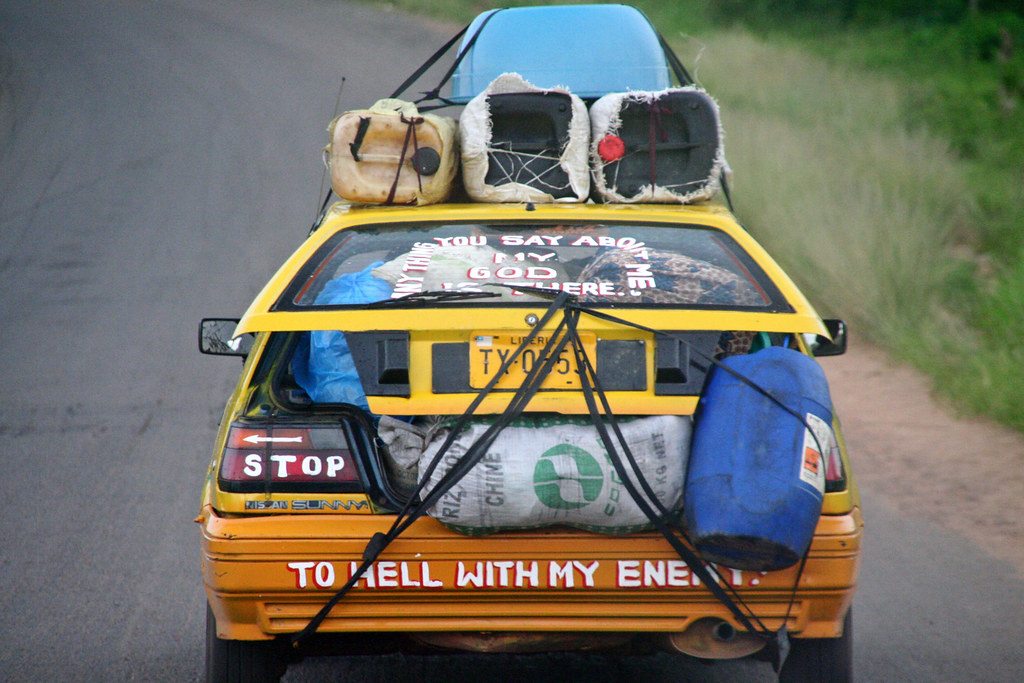
Water Street is known for its fabric shops. The larger, more prosperous shops are Lebanese-owned, with proprietors who travel as far as Dubai where there is a large fabric exchange. Cloth vendors converge from all over the world to hawk their wares, and these fabric shops sell anything from cotton prints and tie-dyes to fine Japanese lace and velvet leopard print. Smaller shops usually line back alleys, and are more wooden shacks with plastic tarp than anything else. Finally individual women and boys carry lappas (one lappa is 2 yards) bundled together in plastic tubs and perched on their heads. These vendors usually sell only African prints, which are always a swirl of color, and on closer examination reveal a repeating motif—chickens, crustaceans, giant tubes of lipstick, or tree stumps.
We were happily browsing on Water Street when the skies opened up. The erstwhile roads and sidewalks quickly became a mess of trash, mud, sewage, and water. With no drains and a fierce tropical storm, we were quickly left knee deep in filth. As we debated how to reach higher ground, the local Liberians, huddled underneath awnings, started to shout things like "Roll up your pants!" and "This is Africa!." That's when Megan turned to me and asked, "Can we pull a Moses?"
Posted by
Peggy
at
5/09/2008 03:03:00 PM
0
comments
![]()
04 May 2008
Sparks
Forgive me bloggers, for I have sinned. It has been 11 days since my last post.
And I can’t promise that this one will be altogether all that uplifting. I had to say no to two patients on Friday; saying no is the hardest part of this job.
Ballah
Ballah* is a sixty-five-year-old woman who, for the past six weeks, has noticed a swelling of her jaw. It’s a painful swelling, interfering with her eating, and causing her to lose weight (or, as our interaction went, I’ can peeyn me. I can ee’ freely. Ohhh, I be reducing. Because of the worry... I’m going to miss Liberian English). She had been prescribed antibiotics for the jaw swelling, and had been sent to our dental clinic for further work-up.
God bless our dental clinic. They are the front-lines. Firmly ensconced at Redemption Hospital, a former MSF hospital turned over last year to the Liberian government, our dentists, dental assistants, dental coordinators, dental sterilizers, and a vanguard of translators occupy the former pediatric ICU (which sounds significantly better stocked than it actually is. It's a room. With fans. And numbers on the wall).
They see everyone. Jaw swellings. Ma-too’-be-hurtin’s. My-breasts-be-too-bigs. And Vicki, the indomitable whirlwind of a woman who runs the clinic, brings them in or sends them away with a gentleness and a care that rivals many.
Ballah, she sent to the ship. Unfortunately, Ballah’s jaw swelling was inoperable. See, it wasn’t a simple swelling that was paining her. It wasn’t worry that was causing her to reduce. Ballah had a carcinoma of her gums, a volcanic eruption of uncontrolled tissue growth that had eroded through the bone of her jaw and out her skin, completely replacing normal tissue across about 75% of her mouth. Back home, Ballah would have required a pretty massive operation, and, after an entire day on the operating table, would still have had a significantly greater chance of succumbing to her tumor than of surviving. We would have thrown the proverbial sink at her—surgery, radiation, chemotherapy—to give her that chance.
But, here, there is a bizarre economy. In a situation in which radiation and chemotherapy are not available, in a world in which heroic measures fail more often than not, in a culture in which surgery for palliation is not understood, what is the right way to deal with Ballah? And with the other patients who would, by necessity, not be able to get surgery if Ballah did?
It’s an economy I still struggle with.
Joseph
Joseph’s* story is not much different. Fifty-five years old, retired, with a six-year history of an eye tumor, pushing his left eye forward and causing pain. It was a small thing, externally. Not one of those tumors you look at and immediately start calculating how many nerves you’re going to have to sacrifice getting it out.
Its appearance belied its actual size. A CT scan revealed a large tumor in his frontal sinus, with extension directly into his brain. And the economy reasserted itself. We have no neurosurgeons on-board. What we have is the ability to do a few, basic neurosurgical things, should they be necessary. But nothing more.
Joseph, too, succumbed to the economy. And, having experienced the Liberian health-care system first-hand, I know what we were sending him away to. It makes saying no exceedingly difficult.
But, let me tell you the story of Precious:
Precious
Precious* is Liberia. Her problems are the problems of the health care system of a developing nation. See, on February 5, Precious tripped on her way home from school. She scraped her knee and her elbow. She probably cried. She probably ran home to her mother. She probably got a hug. At home, she could have featured in any number of brightly-lit, quotidian Tylenol commercials. But not in Liberia. Here, there are no manicured front lawns with sun-dappled trees and a stay-at-home mother smilingly washing dishes over a white formica countertop. No soft-focus filters here.
Precious’s mother—a woman who commands amazing respect for the amount she has given up to care for her daughter—brought the girl to the big white hospital ship that had just, that day, arrived in Monrovia. Patients weren’t being seen for another two weeks, and, regardless, Precious wasn’t the sort of patient we could have given anything to. But mom tried. And she was sent off to one of the local hospitals to treat the cellulitis that had set into her daughter's knee.
There, Precious received appropriate antibiotics. Except that she was allergic to them, unbeknownst to anyone. Her face swelled up. Her knee and elbow got no better. And then, slowly, the facial swelling turned into outright death. The tissues on her face succumbed to a condition—unique to the malnourished developing world—called noma. Or, in its more grotesque nomenclature, cancrum oris. Noma is an opportunistic infection that attacks a slightly depressed immune system (usually after measles; sometimes after other infections), almost exclusively in the undernourished child. The bacteria that live in all of our mouths decide it’s time to feast. And feast they do.
Precious was—relatively—lucky. She lost her lips. They turned black and fell off. I’m not making that up.
But she could have lost more—others have lost lips, noses, and eyes. Her mother did not give up. Precious had been befriended by one of the receptionists on the ship, who visited her at the hospital daily. Three months later, during which time her mother had not once been home, not once left her daughter’s side, the infection had been successfully controlled and the noma had run its course.
Precious was brought on-board for reconstruction of her lips. It’s a long, four- or five-month ordeal, with six or seven stages (for those of you facile with lip reconstruction, this is like nothing you’ve ever seen before). She has finished stage I. And, for the first time in three months, mom has been home to sleep in her own bed.
What happened to Precious would never have happened at home. At home, kids eat too much. At home, they get vaccinated against measles. At home, when they scrape their knees, mom drops her dishes, runs out under those sun-dappled leaves, concern dancing in her eyes, antibiotic ointment in hand. At home, we make feel-good commercials about the very thing that has permanently scarred a little girl like Precious.
Man is born into trouble, wrote the ancients, as surely as the sparks fly upward.
Posted by
M
at
5/04/2008 04:39:00 PM
1 comments
![]()
Labels: Liberia, Noma, Patient stories




